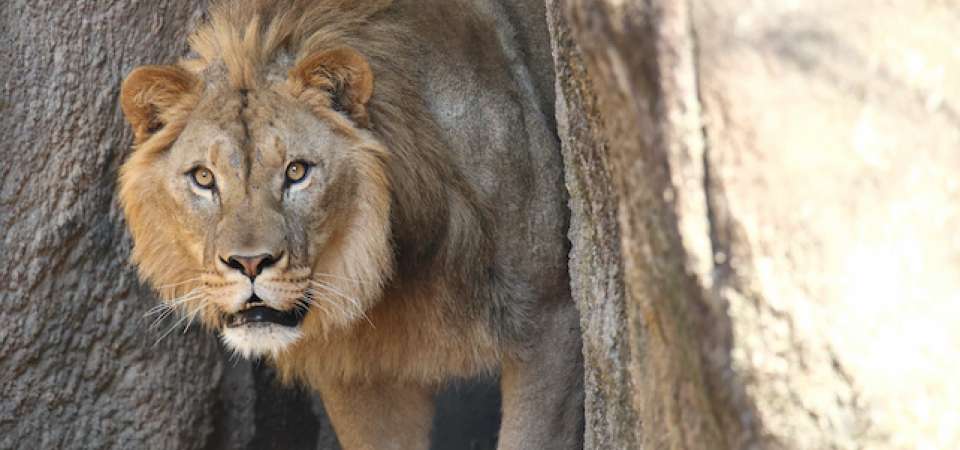


Asheboro, N.C. – Feb. 23, 2023 - The North Carolina Zoo is excited to officially announce its new male lion, Haji, has arrived.
Haji, three years old and weighing 400 pounds, came from the Audubon Zoo in New Orleans as a companion for the Zoo's female lion Mekita, 13. The Association of Zoos and Aquarium (AZA) Lions Species Survival Plan (SSP) recommended the pairing.
Mekita's last mate—23-year-old Reilly—died in August 2022, leaving her as the Zoo's only lion. Reilly lived at the Zoo for 21 years, spending most of his time as Mekita's mate. Haji was brought to the Zoo mainly as a companion for Mekita because lions are big cats that live in social groups called prides.
Although Haji arrived in December, guests could only catch a glimpse of him in the past several weeks. During that time, Haji and Mekita have been going through introductions—comparable to a chaperoned courtship—in their indoor quarters. Introducing lions to new companions and habitats can be a lengthy process.
Haji and Mekita are now on a rotating schedule where guests can see them on habitat. Guests should be able to spot Haji by his growing mane (look for his distinctive mohawk style). His mane will continue to grow and darken as he ages.
"We're excited our guests now get to see Haji more often," said Jennifer Ireland, the Zoo's Curator of Mammals. "We're giving Haji more time to explore his new habitat to help establish his territory. It takes a lot of time and patience to work with big cats. Right now, they can see and smell each other."
Ireland said Haji and Mekita would eventually be able to roam the habitat together as they become more comfortable with each other.
"We are seeing some positive signs in their introductions, such as vocalizations to each other,” she said.
Lion prides in the wild comprise a dominant male, several females, and their offspring. They may sleep up to 20 hours per day. Lions are native to the savannahs and grasslands of Africa and can reach speeds up to 50 mph for very short bursts.
A lion's average lifespan in the wild is about 10-15 years. Male lions under human care have a median life expectancy of 17 years. Males can weigh up to 570 pounds, while females weigh up to 277 pounds.
African lions are listed as "Vulnerable" species by the International Union for Conservation of Nature (IUCN), with populations continuing to decrease due to habitat loss and poaching. An estimated 23,000 to 39,000 lions remain in the wild.
Lions, in particular, have suffered due to poaching, unintentional snaring, and retaliation for livestock predation. The North Carolina Zoo actively supports conservation efforts across Africa, including implementing SMART-based monitoring systems that assist with anti-poaching efforts to help protect lions in areas critical for their survival.
###
About the North Carolina Zoo
At the North Carolina Zoo, we celebrate nature. As the world’s largest natural habitat Zoo, we inspire a lifelong curiosity about animals for the hundreds of thousands of people who visit our Zoo each year. Our dedicated team of experts provides exceptional, compassionate care for the more than 1,700 animals and 52,000 plants that call our Park home. We also lead efforts locally and globally to protect wildlife and wild places because we believe nature’s diversity is critical for our collective future. The North Carolina Zoo invites all of our guests to witness the majesty of the wild in the heart of North Carolina and welcomes everyone to join in our mission to protect nature’s diversity. Visit NCZoo.org to begin your life-changing journey.
About the N.C. Department of Natural and Cultural Resources
The N.C. Department of Natural and Cultural Resources (NCDNCR) is the state agency with a vision to be the leader in using the state’s natural and cultural resources to build the social, cultural, educational and economic future of North Carolina. NCDNCR’s mission is to improve the quality of life in our state by creating opportunities to experience excellence in the arts, history, libraries and nature in North Carolina by stimulating learning, inspiring creativity, preserving the state’s history, conserving the state’s natural heritage, encouraging recreation and cultural tourism, and promoting economic development.
NCDNCR includes 27 historic sites, seven history museums, two art museums, two science museums, three aquariums and Jennette’s Pier, 39 state parks and recreation areas, the North Carolina Zoo, the nation's first state-supported Symphony Orchestra, the State Library, the State Archives, the N.C. Arts Council, State Preservation Office and the Office of State Archaeology, along with the Division of Land and Water Stewardship. For more information, please call (919) 814-6800 or visit www.ncdcr.gov.